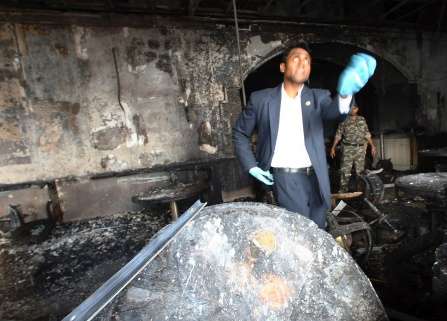Terror attacks offer insights for first responders, study finds

When terrorists strike, emergency workers who have the proper training, information access and a positive work environment will make better decisions, according to research from the University at Buffalo School of Management.
Published in IIMB Management Review, the study was prompted by the terrorist attacks in Mumbai, India, on Nov. 26, 2008, that killed 166 people and are often referred to as India's 9/11.
The research, co-authored by H. Raghav Rao, PhD, SUNY Distinguished Service Professor, Management Science and Systems Department in the UB School of Management, focused on understanding the motivation and decision-making process of first responders during the attacks.
"An officer in the police department, whether in the control room or in the field, makes many critical decisions during a situation like the Mumbai terrorist attacks," says Rao. "Each of these decisions is driven by a motivation, which is usually derived from knowledge of the situation at hand."
The study analyzed surveys from 31 Mumbai Police officers who were involved in the immediate response to the terrorist attacks. In addition, they conducted interviews with 15 middle- to high-ranking officers who directly assisted in the efforts to mitigate the effects of the attacks.
The researchers analyzed the information gathered during these surveys and interviews and offer the following recommendations to prepare first responders for terrorist attacks:
- Remove barriers to information sharing. When responders have timely access to important information in a crisis, they have increased motivation to take action.
- Improve training. Improved training in how to deal with, assess the severity of and quickly respond to crisis situations will lead emergency workers to more helpful actions and decisions.
- Establish an optimistic work environment. Hopefulness improves the likelihood that responders will take positive steps to alleviate crisis situations.
- Create a decision support system. Officers should be trained to pick up important information, make decisions from that information and be provided with the tools they need to communicate those decisions to the necessary personnel.
- The authors also recommend a number of ways Mumbai Police can improve information sharing during such a crisis.
"Many callers to the Mumbai Police control room during the terrorist attacks didn't know the street names in their immediate neighborhood," says Rao. "A campaign to educate residents about these names would help first responders more effectively reach people in need in the future."
In addition, the study recommends sending private closed-circuit television signals to police, broadcasting information across police zones and sending official social media alerts to dispel rumors. Officials also should implement a system of alert levels that define operating procedures under different terrorist threats.
Provided by University at Buffalo

















